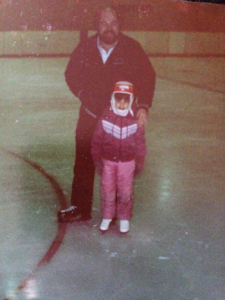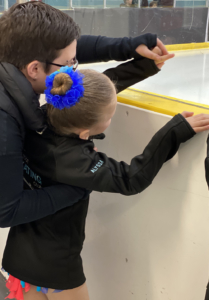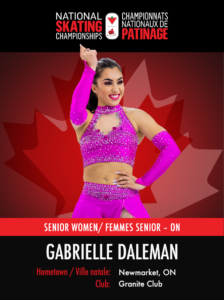Skate Canada International Rewind
For just the second time in its storied history, the arena lights will be dark during the week of Skate Canada International.
Facing the same uncertainty as many sporting events around the globe, the 2020 Skate Canada International, scheduled to be held October 30-31 in Canada’s capital, Ottawa, Ontario, was recently cancelled due to the COVID-19 pandemic. The only other year that Skate Canada International has not been held was way back in 1979 due to a pre-Olympic figure skating competition in Lake Placid, N.Y., host city for the 1980 Olympic Winter Games.
While TD Place will be empty this week, Skate Canada has skating fans covered. We are reaching back into the SCI vault all week long, with highlights, polls and unforgettable performances in Skate Canada International’s renowned history.
Skate Canada International was a part of the ISU Champions Series from 1995-1997, which eventually became the ISU Grand Prix of Figure Skating series in 1998. Skate Canada International is now the second competition in the annual ISU Grand Prix of Figure Skating series.
We kick off the week with a historical timeline looking back at one of Canada’s premier annual international sporting events.
Skate Canada International Historical Results
1973 – The first Skate Canada International takes place in Calgary, Alberta. Canadians Toller Cranston and Lynn Nightingale win gold in men’s and women’s, while Hilary Green and Glyn Watts of Great Britain take the title in ice dance. Pair competition was not introduced until 1984.
1977 – A four-year reign atop the podium for Canadian men ends as Robin Cousins of Great Britain wins in Moncton, N.B.
1979 –Skate Canada International is cancelled due to Flaming Leaves, a competition that took place in Lake Placid, N.Y, as a pre-Olympic event. The decision is made not to hold Skate Canada International to allow skaters to compete on Olympic ice.
1983 –Brian Orser wins his first of three Skate Canada International men’s titles in Halifax, N.S. Tracy Wilson and Rob McCall of Canada capture gold in ice dance while East Germany’s Katarina Witt wins the women’s crown.
1984 – Held in Victoria, B.C., this is the first year that pair skating is included at Skate Canada International. Elena Bechke and Valery Kornienko of the USSR win gold.
1984 – Midori Ito of Japan wins the women’s gold medal in Victoria. She would go on to capture the 1989 world title and Olympic silver in 1992.
1985 –Russian pair legends Ekaterina Gordeeva and Sergei Grinkov win gold in London, Ont. They would win gold again eight years later in Ottawa.
1986 –Elizabeth Manley of Canada tops the podium in Regina, Sask. Two years later, she would win Olympic silver in Calgary.
1988 –Kurt Browning wins his first Skate Canada International gold medal in Thunder Bay, Ont. He would add SCI titles in 1990 and 1993.
1989 – Before winning Olympic gold, Kristi Yamaguchi of the USA is a Skate Canada International gold medalist, winning the women’s event in Cornwall.
1989 – A fours competition is held at Skate Canada International for the first time. Fours is held the next year before being permanently removed from the schedule.
1990 – It’s a golden sweep for Canadians in Lethbridge, Alb., with gold in all four disciplines: Kurt Browning in men’s; Josée Chouinard in women’s; Isabelle Brasseur and Lloyd Eisler in pair; and Jacqueline Petr and Mark Janoschak in ice dance.
1994 – Canadian ice dancers Shae-Lynn Bourne and Victor Kraatz start their gold medal winning streak winning streak in 1994 in Red Deer, Alb., their first of five consecutive golds at SCI. Bourne and Kraatz would also win in 2001.
1995 – Saint John, N.B. hosts Skate Canada International for the first time. Michelle Kwan of the U.S. wins her first of three SCI gold medals. Kwan’s other SCI titles also came in the Canadian Maritimes – 1997 in Halifax, N.S. and once again in Saint John in 1999.
1997 – Elvis Stojko wins his last Skate Canada title in Halifax, N.S.. He also won the title in 1991, 1992, 1994 and 1996.
1996 – Germany’s Mandy Woetzel and Ingo Steuer strike gold in pair in Kitchener-Waterloo, Ont. Two years later, they would become Olympic bronze medallists in Nagano, Japan.
1998 – Skate Canada International joins the ISU Grand Prix of Figure Skating, becoming one of six events held annually.
1999 – Alexei Yagudin of Russia wins his first of three consecutive Skate Canada International gold medals in Saint John, N.B.
2000 – Back-to-back winners in 2000 and 2001, Jamie Salé and David Pelletier debut their Love Story at Skate Canada International before sharing it with the world at the 2002 Olympic Winter Games.
2004 – Cynthia Phaneuf wins the women’s title in Halifax, N.S., at just 15 years old.
2004 – Canada sweeps the men’s podium in Halifax. Emanuel Sandhu wins gold, followed by Ben Ferreira (silver) and Jeffrey Buttle (bronze).
2005– Germany’s Aliona Savchenko and Robin Szolkowy win their first of four Skate Canada International pair crowns in St. John’s, Nfld.
2006 –Canadian Joannie Rochette wins her first Skate Canada International gold in Victoria, starting a run of three titles in four years.
2007 – Canadian ice dance legends Tessa Virtue and Scott Moir win their first of seven Skate Canada International titles.
2010 – Kevin Reynolds of Canada becomes the first skater to land two quadruple jumps in a men’s short program, landing a quad Salchow, triple toe combination, and a quad toe in Kingston, Ont.
2011 – Javier Fernandez of Spain wins silver in the men’s competition, his country’s first-ever medal on the senior ISU Grand Prix circuit.
2012 – Making her senior Grand Prix debut, Canadian Kaetlyn Osmond wins the women’s crown in Windsor, Ont.
2013 –As the 40th year of Skate Canada International is celebrated in Saint John, N.B., it’s double gold for Canada as Tessa Virtue and Scott Moir finish atop the ice dance podium and Patrick Chan holds off young Japanese sensation Yuzuru Hanyu in the men’s competition.
2014–Kaitlyn Weaver and Andrew Poje claim ice dance gold in Kelowna, B.C., while fellow Canadians Piper Gilles and Paul Poirier earn silver. Meagan Duhamel and Eric Radford capture gold in pair, their first of four consecutive SCI wins.
2015–Canadians earn gold in three of the four disciplines at the ENMAX Centre in Lethbridge, Alb. Patrick Chan beats Yuzuru Hanyu for gold in the men’s event, Meagan Duhamel and Eric Radford finish in top spot in pair and Kaitlyn Weaver and Andrew Poje are golden in ice dance.
2016 –The Maple Leaf is flying high in Mississauga, Ont. as Canadian athletes capture seven of 12 medals, highlighted by gold medals for Patrick Chan (men), Tessa Virtue and Scott Moir (ice dance) and Meagan Duhamel and Eric Radford (pair).
2017 –It’s triple gold for Canada in Regina, Sask. as Katelyn Osmond (women), Meagan Duhamel and Eric Radford (pair) and Tessa Virtue and Scott Moir (ice dance) finish in top spot. Shoma Uno of Japan wins gold in the men’s event.
2018 –Japan’s Shoma Uno wins SCI gold for the second straight year, while Elizaveta Tuktamysheva of Russia is the women’s champion. The U.S. team of Madison Hubbell and Zachary Donohue are crowned ice dance champions. Canadians Kirsten Moore-Towers and Michael Marinaro (pair) and Piper Gilles and Paul Poirier (ice dance) take home bronze medals.
2019 –In what is believed to be the largest margin of victory in ISU Grand Prix history, Yuzuru Hanyu wins the men’s event by 59.82 points, landing six quads over his two programs. Piper Gilles and Paul Poirier capture the gold medal in ice dance, the 13th time in 15 years that a Canadian team has won the ice dance event at Skate Canada International. Russian sensation Alexandra Trusova wins gold in the women’s competition, while fellow Russians Aleksandra Boikova and Dmitrii Kozlovskii finish atop the podium in pairs.
2020–Skate Canada International, scheduled to be held in Ottawa, Ontario, is cancelled due to the COVID-19 pandemic. It is only the second time the event will not be held since 1973. The 1979 edition of the event was not held due to a pre-Olympic competition that was held in Lake Placid, N.Y.


 I started out in skating after watching the 1988 Olympics and insisting to my mother that I wanted to ‘fancy skate’. Being the supportive and encouraging parents they are, my parents put me in recreational lessons then into CanSkate, where I quickly fell in love with our sport.
I started out in skating after watching the 1988 Olympics and insisting to my mother that I wanted to ‘fancy skate’. Being the supportive and encouraging parents they are, my parents put me in recreational lessons then into CanSkate, where I quickly fell in love with our sport. I was in eleventh grade before I came out to myself and began coming out to others. After witnessing other friends experience rejection from their adult mentors, teachers and coaches I wasn’t sure I could survive it if it happened to me and couldn’t risk it with mine. This comes across as dramatic, but in truth was probably pretty spot on. I made the decision to change coaches to a younger, less experienced coach in order to not feel any possible negative (or perceived negative) reaction as acutely. To avoid any disappointment in myself as a person from people whose respect I couldn’t stand to lose. In effect, and to my own skating’s detriment, at the end of my personal skating career, I abandoned them before they could me. To be clear, I didn’t have an inkling of how they’d react. I just couldn’t muster up the courage to risk them finding out. I remember my female coach hiding her tears and thinking that at least she was disappointed in me for something I chose rather than something I couldn’t. I remember the last hug from both of them and running out of the arena sobbing hysterically – I knew I’d made a huge mistake but I wasn’t willing to rethink my decision because it was still easier than the alternative that might never and probably wouldn’t have happened anyway. Both of them left our club very suddenly immediately afterwards, moving full time to the other club they taught at. They had been staying until I graduated and moved on; I was their ‘last’ at our club. When I left them, they left, too.
I was in eleventh grade before I came out to myself and began coming out to others. After witnessing other friends experience rejection from their adult mentors, teachers and coaches I wasn’t sure I could survive it if it happened to me and couldn’t risk it with mine. This comes across as dramatic, but in truth was probably pretty spot on. I made the decision to change coaches to a younger, less experienced coach in order to not feel any possible negative (or perceived negative) reaction as acutely. To avoid any disappointment in myself as a person from people whose respect I couldn’t stand to lose. In effect, and to my own skating’s detriment, at the end of my personal skating career, I abandoned them before they could me. To be clear, I didn’t have an inkling of how they’d react. I just couldn’t muster up the courage to risk them finding out. I remember my female coach hiding her tears and thinking that at least she was disappointed in me for something I chose rather than something I couldn’t. I remember the last hug from both of them and running out of the arena sobbing hysterically – I knew I’d made a huge mistake but I wasn’t willing to rethink my decision because it was still easier than the alternative that might never and probably wouldn’t have happened anyway. Both of them left our club very suddenly immediately afterwards, moving full time to the other club they taught at. They had been staying until I graduated and moved on; I was their ‘last’ at our club. When I left them, they left, too.